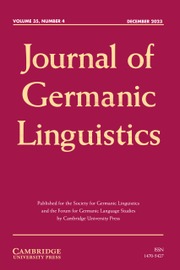No CrossRef data available.
Article contents
Beyond Do-Support and Tun-Periphrasis: The Case of Finite Verb Doubling in Karrharde North Frisian
Published online by Cambridge University Press: 11 November 2016
Abstract
All West Germanic languages possess periphrastic verb constructions in which a finite dummy auxiliary ‘do’ combines with an infinitival thematic verb (compare do-support in English and tun-periphrasis in German). In Frisian, periphrastic verb constructions are not very common. It is all the more surprising, therefore, to find a general periphrastic verb construction in Karrharde North Frisian that seems to go beyond the typology of these constructions in West Germanic to some extent: The construction is rather unconstrained, it features a mysterious dummy auxiliary wer- and, most strikingly, both the dummy auxiliary and the thematic verb are finite. In this article, the basic data on finite verb doubling in Karrharde North Frisian is presented, and the origin of the dummy auxiliary wer- is tracked down. A synchronic analysis of the construction is proposed that relates it to the periphrastic verb constructions in other West Germanic languages. It is shown that finite verb doubling is in most respects a garden variety periphrastic verb construction, and that its special properties can be traced back to the fact that the dummy auxiliary developed from the complementizer wer ‘if, whether’ (possibly under language contact with Danish).
- Type
- Articles
- Information
- Journal of Germanic Linguistics , Volume 28 , Special Issue 4: New Directions in Comparative Germanic Linguistics , December 2016 , pp. 317 - 348
- Copyright
- Copyright © Society for Germanic Linguistics 2016


